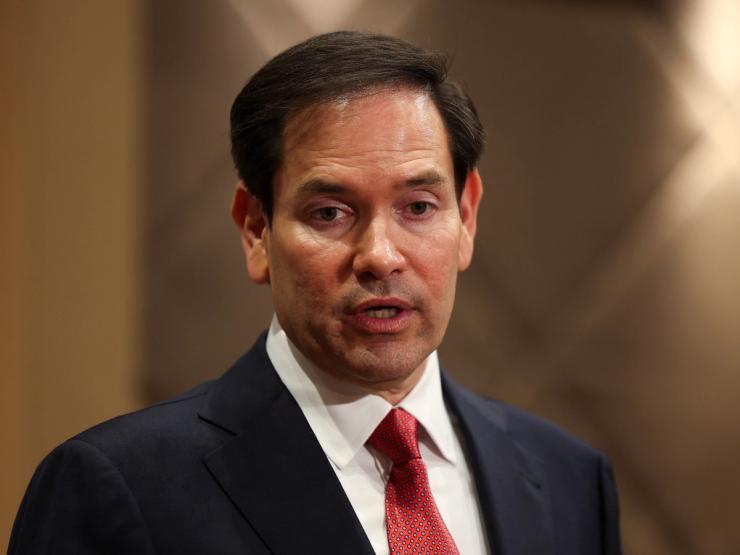The Scoop
The Trump administration is preparing to expand migrant repatriations using a nearly $3 billion “America First Opportunity Fund” at the State Department — specifically to encourage more countries to take back foreign nationals now living as undocumented migrants in the US.
The fund was sparsely detailed in the Trump administration budget request earlier this month. Documents note it will be used for a wide range of “strategic investments that make America safer,” and mention broad priorities like countering China and repatriations.
But according to a senior State Department official and an administration official, President Donald Trump’s aides are eyeing at least part of the fund as a vehicle to convince more countries to take back their citizens.
That arrangement appears distinct from the State Department’s existing one with El Salvador, which has reportedly been paid $6 million for one year to detain migrants, including alleged members of the Venezuelan Tren de Aragua gang. Secretary of State Marco Rubio has said that El Salvadoran President Nayib Bukele also suggested housing criminals who are US citizens in his country’s prisons.
“We will ensure the funds are being effectively used to make America safer, which will include continuing to expand repatriation efforts to incentivize countries to accept their own citizens who are in America illegally,” the State Department official told Semafor.
It’s not clear yet whether Congress would need to formally sign off on the fund in order for the Trump administration to use the State budget to pursue expanded repatriation, nor is it clear whether the specific incentives that would be offered would be in the form of direct monetary payments.
But Democrats are already raising questions. They’re pushing the administration for more answers about the proposed fund, the idea for which is said to have originated at the Office of Management and Budget, rather than at the State Department.
“I don’t know what the hell it is,” Sen. Brian Schatz, D-Hawaii, the top Democrat on the Senate Appropriations subcommittee with control over the State Department’s budget, told Semafor.
Schatz said the administration has failed to respond to numerous inquiries about the budget request in general: “The customary way to do this is to come down to Congress and explain themselves and make an ask.”
Know More
Democrats questioned State Department officials about the administration’s plans for the fund during a private briefing after the budget came out, one party aide said, but they were given few details beyond the description in the public budget request.
“For all intents and purposes, this is a slush fund,” the Democratic aide argued.
The administration official told Semafor that the goal of the fund is to be “flexible” on all targets — from partnering with allies to repatriations — in order to make headway on Trump’s priorities and his “America First” foreign policy agenda.
By contrast, new spending for fiscal year 2024 and through March of this year at the US Agency for International Development, which the Trump administration effectively shuttered and moved under State, was $44 billion, according to the Center for Global Development.
The administration’s proposed new $2.9 billion fund is also being paired with a proposed increase to the Development Finance Corporation at the State Department, which Trump’s budget proposal describes as supporting “US national security and American interests through billions in loans and guarantees.”
The fund is managed by OMB’s Amaryllis Fox Kennedy, the daughter-in-law of Health and Human Services Secretary Robert F. Kennedy Jr., a source familiar with her position confirmed. Her official title is associate director for intelligence and international affairs — a job that, as RealClearPolitics reported, puts her in charge of overseeing budgets for the CIA and the other 17 intelligence community agencies.
shelby and morgan’s view
A president’s budget is widely seen as aspirational, and rarely does the document get adopted by Congress in its entirety. Rather, it sets up a tug-of-war on Capitol Hill over how the government spends its money.
But in the case of the America First fund, it’s easy to see how a tranche of money could get established at State to execute Trump’s immigration crackdown — regardless of whether lawmakers vote to approve it under the proposed name.
The administration is already incentivizing migrants to leave the US with offers of cash and paying El Salvador to accept planeloads of deportees. It’s not surprising that officials are looking at ways to expand these types of programs.
An aggressive use of State funds to fuel repatriations in particular — amid deep cuts to foreign assistance — could make things uncomfortable for Republicans as they consider how to move forward with appropriations with full control of Congress.
The other issue lawmakers may have with the America First fund: the lack of specificity, so far, of how the “flexible” money will be used. Members of both parties typically rely on earmarks to direct money for specific purposes.
Room for Disagreement
Some see the fund as a reflection of the administration’s focus on economic resilience and the private sector, not just a tool for Trump’s aggressive immigration policies.
Trump’s business-focused foreign policy was on display last week as he toured the Gulf, announcing billions of deals in private-sector investments and weapons sales to bring the US closer to the region.
The Trump administration really wants the US foreign assistance architecture “to be grounded in deals,” a former official said.
Notable
- Senate Republicans on Friday blocked a Democratic resolution that would force the administration to report to Congress about how it is complying with court orders relating to deportations.
- The “biggest winners” in Trump’s budget proposal? Defense spending, border security, and veterans health care, Axios noted.

